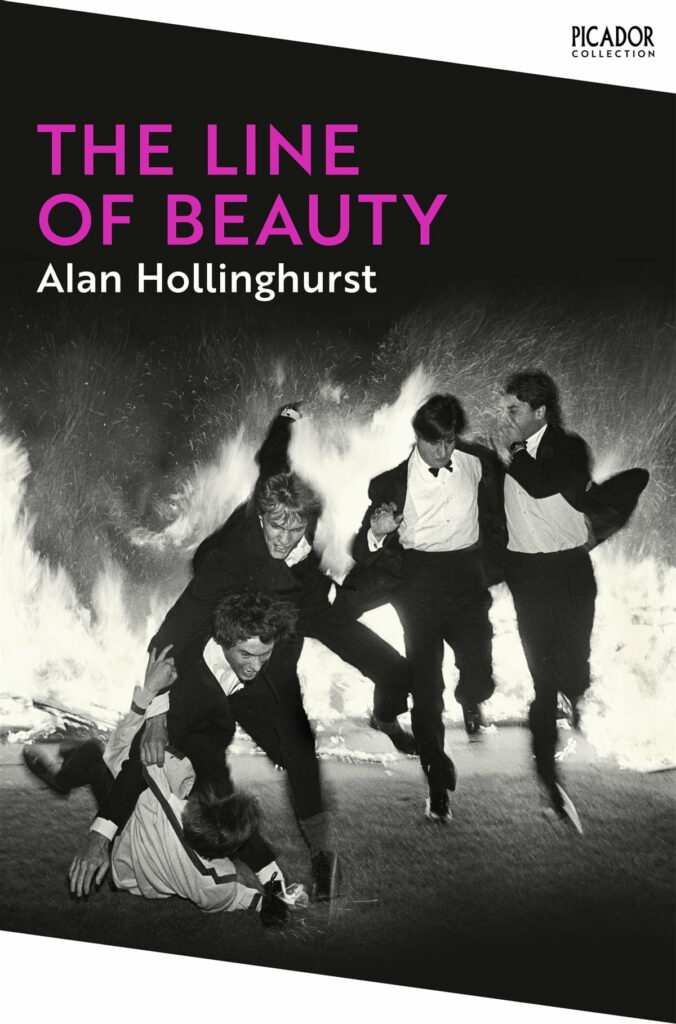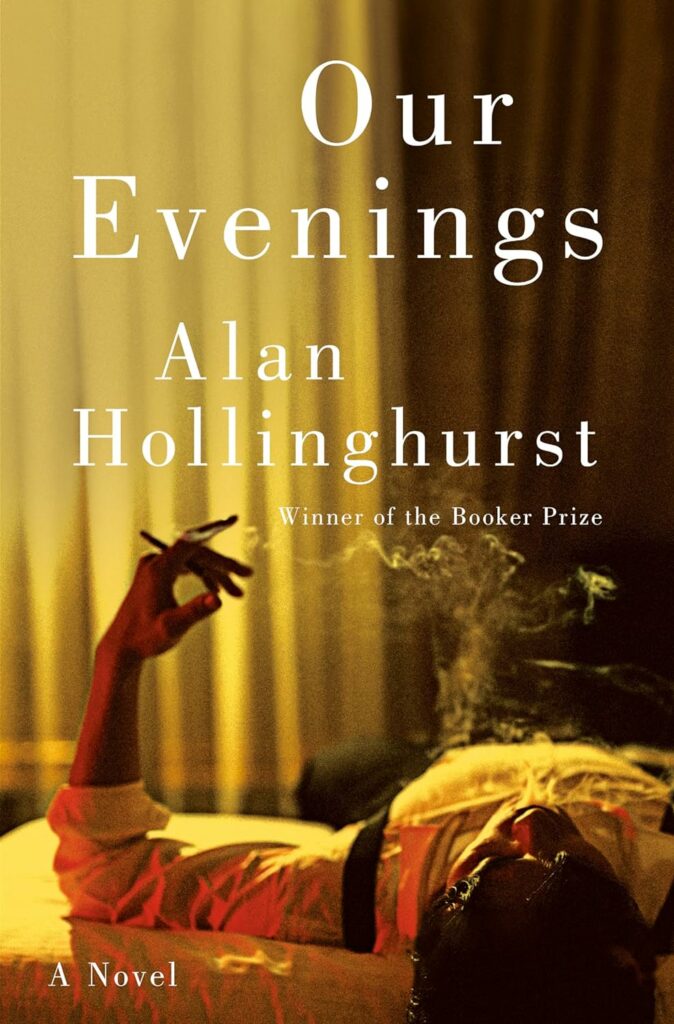‘Alan Hollinghurst is one of our best living writers – the LGBTQ+ community has much to thank him for’
To celebrate the release of the author's new novel Our Evenings, Jack Cullen casts an eye across his previous five, looking at the significance of this daring, accomplished LGBTQ+ author
By Jack Cullen

Long before Charli XCX was bumpin’ from party to party, Nick Guest – the lead character in The Line of Beauty by Alan Hollinghurst – was having something of a Brat Summer.
The novel, published in 2004, follows its attractive protagonist as he buggers his uni friends in bathrooms, takes lines off their thighs (there are plural meanings of the “line” referenced in the novel’s title), flirts with paparazzi and gets pummelled behind MPs’ sheds. It was this unapologetic and raucously gay book that thrust Hollinghurst into a spotlight aged 50. “Gay sex wins Booker”, one tabloid yelled, as Alan himself was interviewed about it on the news – it was a cause célèbre!
The Line of Beauty was a cunningly-observed, bleakly poignant gay comedy of sorts that is just as entertaining today as it was 20 years ago: the satire still sharp, the vivid imagery just as clear. The book cleverly entwined Britain’s upper middle class ‘lived experience’ with a gay coming-of-age tale and wider issues of 1980s Britain, provoking thought while having fun along its path. Hollinghurst’s cheeky humour blends brilliantly with the novel’s reckless nihilism and there’s a shrewd depiction of the AIDS crisis just as AIDS was beginning to gain pace both inside bodies and within the public’s fearful gullible mind. The novel had a buzz of a kind rarely seen today (if you haven’t read it, brilliant bookshop Gay’s The Word will have it in stock).
“Alan Hollinghurst was a Trojan horse and he penetrated literature’s elite”
It’s worth remembering that when Hollinghurst arrived, the media was hostile towards the LGBTQ+ community. There were no Pride month Waterstones events or jaunty rainbow tables toppling with queeny manifestos, cartoon twink sagas and jazzy memoirs. Gays had to strap on crampons and scale shelves at the backs of libraries with a head torch if they wanted to find themselves on the page, fainting as they inhaled asbestos in search of Stephen Fry or Thomas Mann.
Hollinghurst was a Trojan horse and he penetrated literature’s elite, running amok with his twinkling cock-fuelled historically-sound dramas. He went to Oxford himself and so was equipped for this task, using his hard-earnt ‘privilege’ in cunning ways, shining a light into literature’s darkest rooms where his contemporaries dared not look. He took a financial hit for this possibly, and it’s quite likely that movie producers seduced by the filmic novels of, say, Ian McEwen or Kazuo Ishiguro, shied away from Hollinghurst’s lubey quill, an oversight which I hope producers of the future might rectify.

Before publishing his own novels Hollinghurst had done his bit reading and reviewing hundreds of books for the Times Literary Supplement, where he worked as a deputy editor, and so in 1988 when he blindsided us with his mouth-watering debut The Swimming Pool Library, he was ready for the siege ahead; his prose was on fleek.
If you thought Saltburn was odd, wait until you read The Swimming Pool Library. With its restaurateur porn shoots, lantern-lit gym sex, kitchen floor watersports, ghostly teenage rent boys and hyper-violent council estate scenes, the novel takes us on a heady tour of London’s highs and lows, from black tie dinners to backstreet gang-bangs, submersing the reader into a compelling paranoid web that asks more questions than it answers. The Swimming Pool Library is one of those books that is so good you can almost feel it – the glossed ceramics of its lemon-fresh urinals, the dusty tile work of its occultist Roman mosaics, the fast pulse of its throbbing flesh.
“Each page of an Alan Hollinghurst novel fizzes like a glass of champagne”
This was followed in 1994 by The Folding Star, Hollinghurst’s difficult second album. This thick-set raunchy thriller follows an English tutor in Belgium who is hell-bent on seducing a blond twink that he tutors. This cat-and-mouse thriller is a marvellous portrait of obsession. Will the star pupil indeed fold? After edging his readers for some 200 pages The Folding Star explodes with a messy multipart climax before leaving us in suspense with its torturously vague final page.
There’s more to Warhol than soup tins, there’s more to Björk than a swan dress, but anyone successful in pop culture gets boiled down by the press to a few haphazardly true symbols. Journalists tend to say the same things about Hollinghurst – “upper class” this and “Oxford” that, he is belittled sometimes to a writer of gay romps in neo-gothic houses, Brideshead gets OnlyFans, Jane Austen goes to Vauxhall. But his novels house a wider coterie of hugely enjoyable smaller characters from varying walks of life. Each page of a Hollinghurst novel fizzes like a glass of champagne: seductive, persuasive, and gently rippling with touches of deeply clever wit. A haunting, almost masochistic, sadness pervades his work and yet each book is also very funny.
These days gay sex has gone a bit main, and so the trad “gay novel” has lost its shock and also some of its meaning. Although being gay is punishable by death in much of the world, being gay is also seen as establishment in Britain’s middle class media bubble – Graham Norton who was once a Brat-ish chat show host is now considered a national treasure, Clare Balding is a proudly married lesbian who casually interviews the royals, while Olly Alexander is rolling around that poor Eurovision stage in search of an edge.
But Hollinghurst paints worlds where few things are certain: the cucumber sandwiches are soft but his duplicitous characters’ agendas are knife-sharp, we see that sexuality is a cold murky lake bubbling with secrets that circle its base. It’s a fascinating time to read Hollinghurst because any safety or complacency we might have felt as gay men in the 00s, is now at risk again – of being attacked by a maniacal far-right, or chewed up from the inside by a self-warring pungent left. It’s no coincidence therefore that his latest novel Our Evenings touches upon Brexit. Even Hollinghurst senses dark clouds looming beyond his rattling Hampstead window panes.

In the 1990s, Hollinghurst released The Spell, a comedy that lampoons gay monogamy and queer assimilation. A toxic story stuffed with seething exes and supercilious frenemies, he writes a blueprint for what would one day become the hashtag #ClaphamGays: gym-fit power bottoms with a disposable income that expresses itself in gaudy ways. Being gay shifts from being an underground family to an over-accessorised cockerel fight. Cotswolds weekends bring the drama in this novel, which reads like a weekend in Soho House with even more coke. The Spell also carried the torch for gay literature from its post-AIDS hysteria into the ecstasy-fuelled hair-gelled optimism of the dotcom bubble. The Spell is Hollinghurst’s midlife crisis novel; in it he brilliantly tackles a confusing moment in time, and it’s very, very, funny.
With status and awards in tow, Hollinghurst turned his gaze to more challenging concepts – regret, nostalgia, the passing of time – themes that ironically feel fresh and sensational in today’s hypersexed landscape of pornographic numbness and identity-obsession. Just as Hockney moved away from nudes to trees, Hollinghurst softened his subjects, and in doing so deepened his worth.
His best novel, perhaps, would come after the success of The Line of Beauty. Itself longlisted for the Booker Prize, The Stranger’s Child is a crushing love story set across three time periods, all linked by the same building and the legacy of a dead poet. Sex happens off the page, disappointing his thirstiest readers, but making the novel even hornier with its mysterious garden walks and epistolary peep shows. We are left to fill in gaps as Hollinghurst holds an antique mirror up to our modern dirty minds.
“The LGBTQ+ community has much to thank him for”
His fifth novel, The Sparsholt Affair, also jumps between decades as we follow the kinkily repressed affairs of wartime Oxford boys, and then the mid-century antics of their spawn, before finally washing up in present-day London, where Hollinghurst dips his nib into what we now call chemsex, one of the characters teasingly touching upon the disgusting selfish life of gay serial killer Dennis Nilsen. A beautiful study of that terse relationship between closet gay fathers and chirpier sons, The Sparsholt Affair looks at shifting 20th century attitudes towards homosexuality in Britain, but we also meet some of his finest female characters, such as Jill, a sexually stoic historian who is moulded just as beautifully as the ornaments that she steals.
October 2024, and Hollinghurst’s sixth novel has arrived after a cool seven year wait. The Sunday Times have already hailed Our Evenings as “the best novel that’s been written about contemporary British culture in the last 10 years” while The Guardian have called it “his finest yet”, juicy praise considering his previous novels have won some of the world’s biggest literary awards. I am currently backpacking down the Vietnam coast so am unable to get my hands on a copy, but I am on chapter 4 of the audiobook (narrated with aplomb by Line of Duty actor Prasanna Puwanarajah and available to buy now on Spotify). Already I am gripped by the toxic adolescent friendship flowering between Dave and Giles.
Hollinghurst is one of our best living writers and the LGBTQ+ community has much to thank him for, his achievements have been wins for our own acceptance around some of society’s most fickle tables. Authors are like chefs, and no matter how brilliantly they can cook, not every dish will be to everyone’s taste. But if you’re yet to sample the raucous menu that is Alan Hollinghurst’s back catalogue, do put him on that Christmas list for Mum. That’s another beautiful thing about his novels – they look so refined, with Mark Vessey’s stylish photographs on the Vintage Classics paperbacks, that mummy will never guess what’s lurking inside. Enjoy! And thank you Alan for your wonderful books which are trusty companions to so many of us.
Jack Cullen is a show producer and writer. You can follow Jack on Instagram here.
